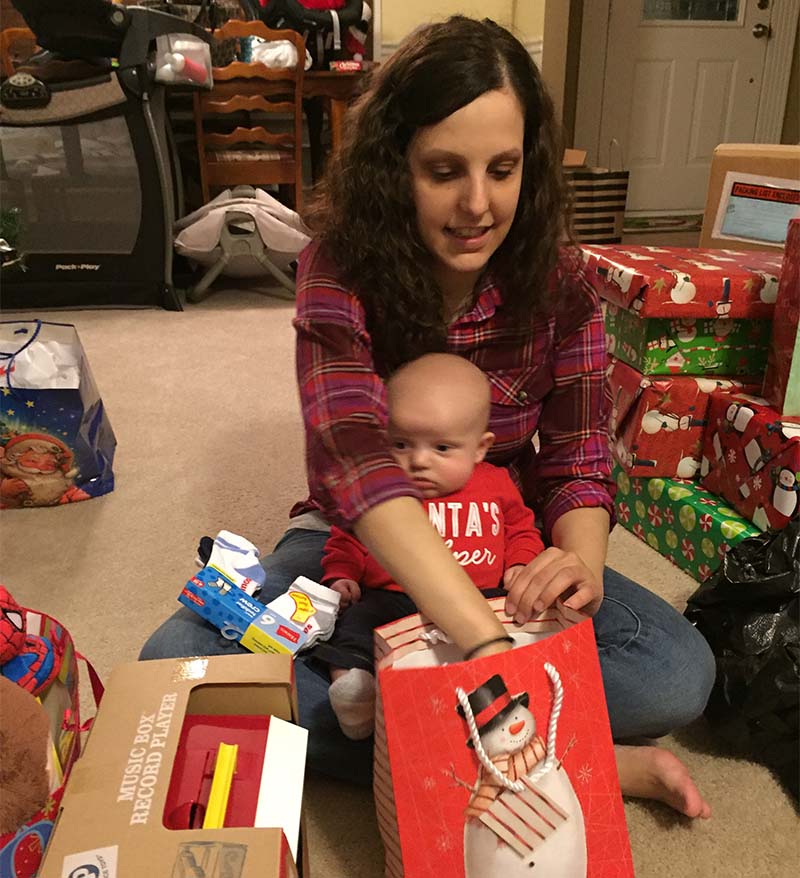Days before Christmas, new mom had a stroke
By Deborah Lynn Blumberg, American Heart Association News

Two months after giving birth and a week before Christmas 2016, Ashley Hammontree was enjoying a snowy day at home in Greenwood, Missouri. Wearing pajamas, she nursed her baby, Elijah, and set him in a swing.
Her husband, Ryan, came inside from playing with their dogs. He made two mugs of hot chocolate while Ashley mulled over what movie to watch.
For the Hammontrees, celebrating the holidays at home with their newborn was especially momentous because of all Ashley went through to get pregnant. Over four years, she'd undergone nine fertility treatments.
When Ryan put a warm mug in Ashley's right hand, she dropped it.
"I don't know what happened. I don't feel good," she said.
She bent over to pick up the cup and passed out. Ryan, who had worked as an EMT for a decade, rubbed her sternum to wake her up. Two minutes later, she came to. He asked her what her name was, where she was and if she remembered what happened.
Ashley couldn't answer. She looked confused. Ryan lifted her right arm and it fell to her side. He helped her stand and her right leg collapsed. Ryan knew the signs of a stroke and suspected Ashley was having one. He called 911.
He ran upstairs to get her clothes. Hearing the ambulance make its way down their icy street, she thought: "This isn't happening. I'm not having a stroke. I'm 30 years old."
EMS workers put her on a stretcher. Her father-in-law, a battalion chief for the local fire department, heard their address over emergency radio. He and his wife met the ambulance at the hospital and walked inside with Ashley. When Ryan arrived with Elijah, his parents took their grandson to their house.
Doctors gave Ashley medicine to dissolve any clots that might be blocking blood flow to her brain. A stroke assessment expert evaluated her, too.
Hours later in the ICU, she could feel her right leg again. That night, she walked to the bathroom with Ryan's help. But she still couldn't move her arm.
The next day, Ashley walked on her own. She asked for a breast pump and pumped her milk; she had to dump it, though, because it was contaminated by medications. A day later, she went home.
Two days later, her parental leave was over. She reported to work as a nurse practitioner in a Kansas City, Missouri, children's emergency room. Meanwhile, she also began going to occupational and physical therapy to regain use of her right arm, which felt heavy and numb.
"It took me three hours to chart on a patient because I couldn't use a mouse," she said.
At home over the holiday, Ashley couldn't hold Elijah. Both she and Ryan were exhausted and overwhelmed. "It was killing me as a mom that I needed support to hold my own son," she said. "We were both a little depressed."

Finally, after a month and a half of physical therapy, Ashley could hold Elijah again. Therapy sessions consisting of snapping and unsnapping buttons on baby clothes helped her regain strength in her arm.
Then, a year after her stroke, Ashley woke up with a severe headache. She couldn't move her right arm. It was a terrible migraine. Although she regained use of her right arm, she developed almost daily migraines.
She went to a specialized headache institute in Michigan for additional tests. Doctors found she has cerebral vasoconstriction syndrome, a condition that causes narrowing of the blood vessels that supply blood in the brain; the main symptom is severe headaches. It's unclear whether that contributed to Ashley's stroke.
"It could have caused the stroke," said Ashley, who's 36 now. "Or maybe giving birth did. Because we don't know what caused it, I have this fear I could have another one."
She takes a calcium channel blocker that increases blood flow to her brain and her headaches are mild. But she has brain fog and tires easily. Twelve-hour shifts at the hospital are exhausting.
She wears hearing aids after experiencing what was likely stroke-related hearing loss five years after her stroke. She uses a Bluetooth stethoscope at work. Stitching up patients isn't possible because she lacks some fine motor skills in her right hand.
But otherwise, she's regained full use of her arm. She works out every day and lifts weights. "I'm trying to do everything I can to prevent another one."
Ryan worries, too, about another stroke. Christmastime is a hard time for the Hammontrees.
"Staying strong for her is often my No. 1 job, being her personal cheerleader and encouraging her to push on," Ryan said. "But I'm here to tell anyone who will listen, 'It's OK to be frustrated. There are going to be hard days.'"

Ashley has found solace in sharing her story. "If I can help one person, and they share my story with one person, then there's this ripple effect and I've done my job."
Since 2018 she's volunteered with the American Heart Association. She attends her local Go Red for Women luncheon where she has taught hands-only CPR. Knowing the signs of a stroke – face drooping, arm weakness and speech difficulty – and understanding not everyone will have all symptoms, is critical, she said.
She tells survivors, "Never lose hope. There were days when I didn't get out of bed. I was so scared that something was going to happen to me again. But each day is going to be a new day, and you've got to get up and keep going."
Stories From the Heart chronicles the inspiring journeys of heart disease and stroke survivors, caregivers and advocates.
If you have questions or comments about this American Heart Association News story, please email [email protected].





